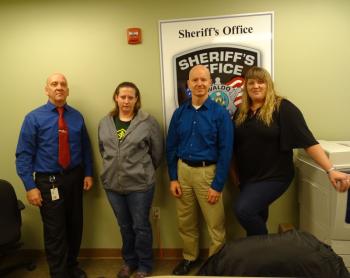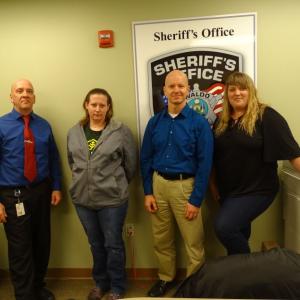Recovery coaches, training get established Waldo County to combat opioid epidemic
BELFAST — Volunteers of America Northern New England and the Waldo County Sheriff’s Office are recruiting volunteers to train to become part of the newly formed Maine RecoveryCorps. The goal is to tackle substance abuse and opioid epidemic in the community.
The Maine Coastal Regional Reentry Center has partnered with Healthy Acadia to launch Maine RecoveryCorps, which is funded by an Americorps grant from the Corporation for the National and Community Service.
Maine RecoveryCorps focuses on, “expanding recovery coaching to strengthen recovery support services and to improve recovery success among individuals facing substance use disorders, with an emphasis on opioid use disorders,” according to a press release.
The Reentry Center is just one of many organizations in five counties that will host full and part-time RecoveryCorps members. Those counties include Aroostook, Hancock, Knox, Penobscot, Waldo, and Washington. In total; Maine RecoveryCorps will support 30 members spread across the six regions.
Those in Waldo County will work directly with men and women leaving Two Bridges Regional Jail and Reentry Center residents who are returning to the county.
Waldo County Sheriff’s Office Chief Deputy Jason Trundy said the program is an offshoot of sorts from the WSO Recovery Committee, which was formed during the summer of 2018.
The group has been working to tackle substance abuse in the community. Some of the established methods of helping those with addiction include support and medically assisted treatment programs, which are paid for through a different grant.
The most recent grant is through Healthy Acadia. Robyn Goff, program manager for Volunteers of America Northern New England, said she learned about the available grant due to familiarity with Healthy Acadia due to living in Hancock County, where the organization is located.
According to Elsie Daniels, executive director of Healthy Acadia: “The Maine RecoveryCorps program represents a significant expansion of recovery coaching services across a broad region. We’re thrilled that the Corporation for National and Community Service has recognized the need to expand services to support individuals seeking recovery from opioid and other substance use disorders, and that they saw the value that Americorps members can bring in the form of recovery coaching. These Americorps members will meet pressing local needs as they develop civic and leadership skills that will last a lifetime.”
VOA is a Recovery Committee partner and Goff recognized the opportunity to get some recovery coaches in Waldo County, according to Trundy, who said:
Recovery Coach Academy
Recovery Coach Academy will take place March 12-15 from 8:30 a.m. to 5 p.m. each day. The cost to attend the four-day course is $200 and it will be taught by Denise Black and Terri Woodruff, of Healthy Acadia. Both are graduates of Recovery Coaching Academy & Training of the Trainers Program at the Connecticut Community for Addiction and Recovery.
There are full and partial scholarships available to those in need of financial assistance with anyone interested “strongly encouraged to apply.”
For more information contact:
“Rather than just sit back and be reactive to everything, we’re trying to be proactive and having recovery coaches that can work with folks in the community that are in need of that. It was a perfect fit. So we decided we were going to apply for the grant and [VOA] took the lead on that and here we are today, we’re actually starting to get to the point of implementation.”
The grant
Healthy Acadia applied for the grant through the Americorps program and needed to find host sites to place the incoming recovery coaches. This led to a contract between Healthy Acadia, VOA, and the WSO, according to Goff.
The WSO is currently sponsoring one full-time coach while VOA is sponsoring the two other coaches. The grant is renewable for three years, which will give the recovery coaches a chance to decide whether they want to continue their positions each year.
In addition to the Healthy Acadia grant, the WSO and VOA each contributed $10,000 to the project, with WSO’s portion coming from their community corrections funds.
“So for a $10,000 investment we got a 40 hour a week full-time recovery coach out of it, so for us, it was a no-brainer,” Trundy said.
The possibility that the current recovery coaches might not return to their positions after their Americorps contract is up is one reason why Goff and Trundy are focused on upcoming training, which will prepare volunteers to serve as recovery coaches.
While the training costs $200, there are full and partial scholarships available for those who are interested but unable to pay the fee. All interest parties are urged to inquire regardless of their financial situation.
Though there are a limited number of paid positions, community support is an important aspect of the program and anyone who completes the upcoming training, which occurs in March, will be qualified to apply with Healthy Acadia for a paid position, but they are hoping many more will volunteer.
Trundy noted that people taking the training will not automatically get a part-time or full-time job.
“[Healthy Acadia] is trying to build up the number of people that are trained to be recovery coaches. That’s the training we have coming in March. They’d like to have about 14 to hold the training but they’ll take as much as 20 or more.”
“I’m going to take the training, but I’m not going to take it because I’m going to become a recovery coach, but because I want to learn more about the program. I want to know more about the training, I want to have a better understanding of it,” Trundy said.
Members of the RecoveryCorps will “engage in recovery coaching, an innovative form of peer-to-peer recovery support. RecoveryCorps coaches will serve as personal guides and mentors for people seeking recovery, helping them remove barriers and navigate systems to meet their treatment, wellness, and recovery support goals,” according to the press release.
Those serving as coaches “have typically experienced substance use disorder either directly or through someone close to them,” the release notes.
Recovery coaches in the community
According to a summary of the Waldo County recovery coach provided by Trundy: “the grant obtained by the Sheriff’s Office and VOA will aid our current efforts by providing individuals to engage in recovery coaching, an innovative form of peer-to-peer recovery support. Coaches will serve as personal guides and mentors for people seeking recovery, helping them remove barriers and navigate systems to meet their treatment, wellness, and recovery support goals. Coaches will work directly with men and women leaving Two Bridges Regional Jail and [the Reentry Center, who are] returning to Waldo County.”
Currently, there is one full-time recovery coach, Megan Colcord, and two part-time coaches.
Colcord is based at the Reentry Center and the three, who began their positions at the start of October, are presently taking on different roles.
One part-time coach has been attending support meetings, while Colcord is stationed at the Reentry Center Monday through Friday. The third recovery coach will soon begin giving rides to those who want to attend community meetings.
Colcord has also begun seeing those with substance use disorders and said that recovery coaching provides a unique opportunity for recovery support from someone who has not only been there but can talk to you about their experiences.
“One of the biggest differences [between licensed therapists and recovery coaches] is that recovery coaches are able to share their personal experience, where if you hold a license with the state you have all those boundaries. You don’t really share your personal story with your clientele,” Robyn Goff said.
Addiction and recovery is something Megan Colcord has experienced first hand.
“I can use different language in our sessions that hit home with people differently than a professional counselor. The upside to what I do is being able to take that relation and make it work for someone else. A lot of times these people are looking just for some relation, so then that’s hard to have with a counselor at times, because there’s that level of professionalism that you have to have,” Colcord said. “I’ve been in recovery for about eight years, so I look at that as long term, someone in long term recovery.”
She said sharing her own history with addiction has helped break down the walls between her and the people she is working to help in their recovery.
“I have a few guys that were like, ‘I’m not talking to this lady,’ and then I was like, listen. Then all of a sudden you see their eyes light up. After that first introduction, they were in my office the next day with the door closed, sitting down and sharing with me. You pull the shade down, they end up crying, and that’s hard for a lot of these guys,” she said. “It’s touching, it really is. It’s nice.”
Though recovery coaching may be new to Waldo County, the practice is already in use in a number of states, including Kansas, where Goff worked.
“Recovery coaching is new to Maine but it isn’t new to the country,” said Trundy. “It’s widely accepted in a lot of areas of the country.”
Trundy expects the program will grow.
“I think there’s going to be a lot of opportunities for it to get used in the future, but it all starts with some of that information gathering now. Whatever population you’re working with, you’ve got to be able to show that something’s effective and that it’s working for you. You’ve got to start somewhere and that’s sort of where we are with this.”
Data collection is something Colcord is also working on in her position as a recovery coach.
“We do a lot of data collection for the state so we know how the recovery coaching is going and where we can implement it better in other counties,” Colcord said.
The program currently has about five participants, though Trundy stressed this is just the start of the group.
“It’s a very small start to something that probably needs to be much larger than it currently is, but it’s a foot in the door,” he said.
Goff said she could see a number of community organizations becoming involved in recovery coaching, including Restorative Justice and Seaport Community Health, which already has a medically assisted treatment program.
Community problems, community solutions
Major Ray Porter, Waldo County Corrections administrator, also supports the program. He believes solutions to battling the opioid epidemic lie with community efforts.
“I think the answer lies in the community,” he said. “Waldo County is rich as far as I’m concerned, and when I say rich, I mean rich in the community that embraces what we do here at the [MCRRC], what our initiatives are. I don’t think you can knock on any door without finding a family member of somebody that they know that is struggling with this disease. It is our passion to move forward and do what we can, with all of our partners, and that’s what makes us strong, partnering with the community. It’s an exciting initiative and I’m glad we’re able to do this.”
While those who prefer entirely punitive measures may not see the benefit of such programs, that mentality is not one shared by the current WSO administration.
“You have a new district attorney that’s coming in that is going to be very aggressively seeking conversion versus incarceration and so I think you’re probably going to see over the next few years a lot of changes, and hopefully some of them are good,” said Trundy. “We’re interested in getting folks to treatment rather than incarceration. We’ve got a lot of people in substance abuse and a lot of people with mental health issues. They don’t belong necessarily in jail If we can get them into treatment before we get criminal conduct, why would we not do that? It just makes sense. It’s the right thing to do, and in my opinion, that’s what this administration at the WSO is interested in: Doing the right thing.”
Erica Thoms can be reached at news@penbaypilot.com
Event Date
Address
United States

























